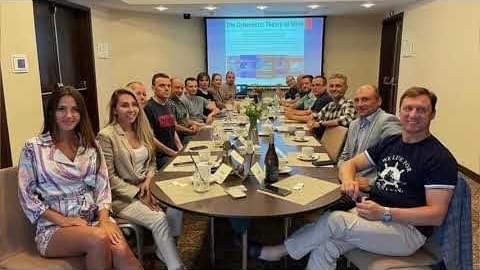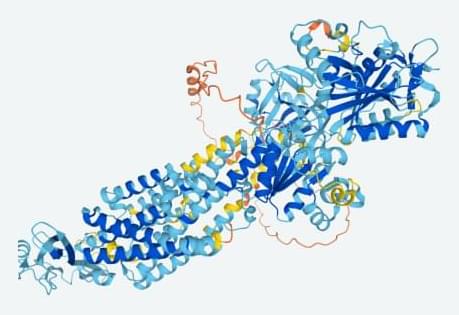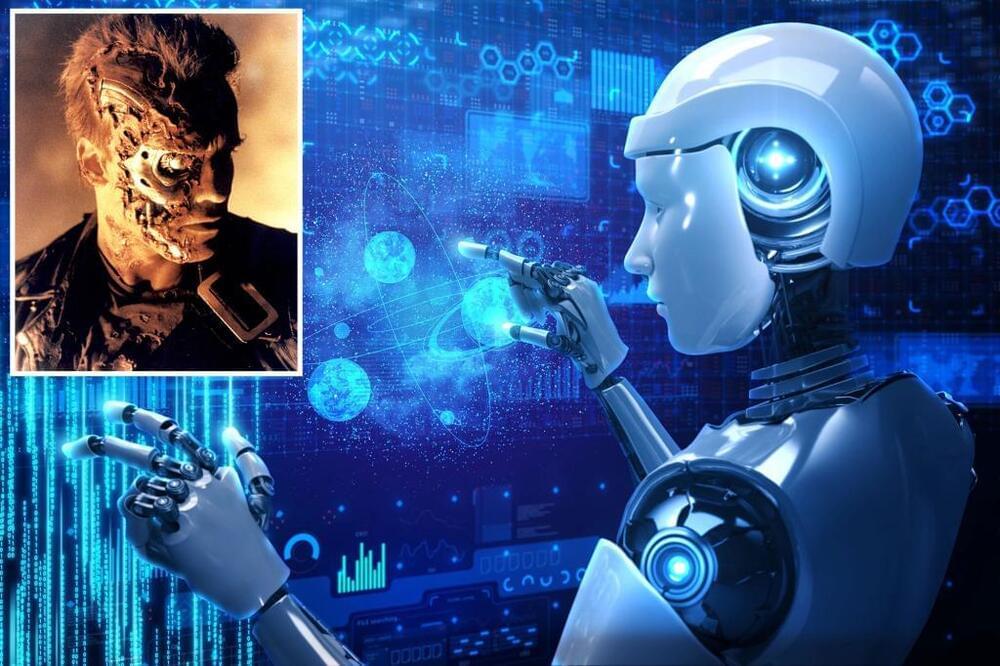Companies say they want ethical AI. But those working in the field say that ambition comes at their expense.
CYBERNETIC THEORY: THE CODE OF REALITY & OUR FUTURE AS CYBERGODS: presenting my published works in a recent talk. Topics include evolutionary cybernetics, computational physics, consciousness, philosophy of mind, cybernetic theory, Omega Point cosmology, physics of time, simulation theory, Global Mind, AGI, VR, Metaverse, Cybernetic Singularity, transhumanism, posthumanism, cybernetic immortality, synthetic telepathy, mind-uploading, neurotechnologies, Fermi Paradox, Dark Matter, Dark Energy, the Argument for Cybertheism, and more.
The main 45-minute slide presentation is followed by a 15-minute Q&A session. This presentation is in Russian with slides and subtitles in English.
Russian-American futurist Alex M. Vikoulov presents his published works in a talk titled CYBERNETIC THEORY: THE CODE OF REALITY & OUR FUTURE AS CYBERGODS at the Rotary Club, The Grand Autograph Hotel, Novosibirsk, Russia, on July 19, 2022. The main 45-minute slide presentation is followed by a 15-minute Q&A session. This presentation is in Russian with slides and subtitles in English (for subtitles turn on caption in settings).
Author publications referenced:
The Syntellect Hypothesis: Five Paradigms of the Mind’s Evolution (2020), available as a Kindle eBook, paperback, hardcover and Audible audiobook: https://www.amazon.com/Syntellect-Hypothesis-Paradigms-Minds…atfound-20
The advent of Large Language Models (LLMs) has unleashed a torrent of possibilities for cutting-edge technology. These powerful computer programs, capable of processing vast amounts of human language data, have paved the way for revolutionary tools like advanced chatbots and voice-controlled devices.
Perhaps the most striking example of this technology in action is ChatGPT, one of today’s hottest internet sensations as of late. ChatGPT is an AI platform that represents the forefront of what we can achieve when we infuse natural language with AI.
But as humans continue to push the boundaries of what’s possible, we are also turning our attention to another frontier: decoding the languages of animals. This article will explore the latest progress in this research, the potential opportunities it could unlock, and the possible risks it could unleash.
What is Atomic AI?
Posted in biotech/medical, robotics/AI
They’re warning of a global AI-pocalypse.
While artificial intelligence systems might make lives exponentially easier, they could also have a sinister side effect — making us go extinct. That’s right, researchers are deeming rogue AI an “existential threat to humanity” that needs to be regulated like nuclear weapons if we are to survive.
Last week Magnus Carlsen, the world chess champion, directly accused Hans Niemann, a U.S. grandmaster, of cheating during their game at the Sinquefield Cup, in St. Louis, Mo. He thus made plain an accusation he had been hinting at for weeks.
Carlsen has so far provided no evidence to back up his charge, nor has he specified how the cheating took place. Everyone agrees, however, that if there was cheating, then it must have involved computers, because nothing else could dismay Carlsen, whose rating of 2,856 is higher than that of any other player. And everyone seems to have chosen sides.
Exploring Technocracy: Preface
Posted in ethics, governance, habitats
While many have claimed to fix politics, very few even came close. Centuries have come and gone with their empires and ideals. Despite the many attempts to reform and improve the political landscape, the issues at hand remain largely unchanged. Corruption, inequality, and moral decay continue to plague governments around the world. It is clear that simply implementing new systems or electing the same leaders is not enough to address these longstanding issues. To truly reform and reverse the decay we see will need more. It will take a multifaceted approach that involves both systemic changes and individual actions, and some radical new ideas.
Many people find themselves today in countries that are repeating history. Inflation that only taxes the working class. Scandals from politicians that care not for the country nor the people they claim to represent. Lies of taxing the wealthy while continuing to burden all others with the shackles of debt. Fear and alarm echoed through every channel of state media that does nothing but leave the public despondent and hopeless about their future. Constant pandering and pilfering by people who see the nation they reside in as nothing but a sinking ship to be looted and left.
Fixing political systems has been a problem prominent in my mind for a long time. With the current order and systems of governance collapsing globally many have begun to ponder this as well. Unfortunately for the simple-minded, I foresee the rise of autocracy, be it communism, socialism, republicanism, or fascism. Such a thing cannot be averted and in fact, many people I doubt would even want it to be. The world has cried out far too long for order, and sooner or later every society will heed that call. Proof enough of this observation would be the nationalist movements that have gained widespread traction in 2022. While I won’t name them such parties and movements have spawned in virtually every western nation. The reason for this is painfully simple: democracy has failed in many people’s lives. It has failed to increase wages or lower housing costs, or even provide reasonable public services.
Takes a look at how neuroscience is inspiring the development of artificial intelligence. Our amazing brain, one of the most complicated systems we know about, is inspiring the development of intelligence machines. Machines that may well surpass our own intelligence and could birth a new species on the planet. Opportunity and danger lie beyond the singularity!
For those who purchase the video on Vimeo https://vimeo.com/ondemand/towardsingularity there are extended interviews that give further insight into biologically inspired AI technology.
Genre: Documentary.
Duration: 1 hour 6 minutes.
Subtitles: English.
Release: 19th February, 2020
Production: Perfekt Studios.
Director: Matthew Dahlitz.
Director of Photography: Jachin Dahlitz.
Soundtrack: Matthew Dahlitz.
CHAPTERS:
00:00 Introduction.
02:41 Our Amazing Brain.
08:13 Brain Inspired AI
16:23 Current AI
24:00 Smart Robots.
31:37 Integration.
34:33 Concerns.
37:19 Toward AGI
44:06 Dangers.
51:52 The Future.
01:02:32 Close & Credits
This video covers Mars in 2050 and 10 future technologies in the first Mars city. Watch this next video about the world in 2050: https://bit.ly/3J23hbQ.
► Support This Channel: https://www.patreon.com/futurebusinesstech.
► Udacity: Up To 75% Off All Courses (Biggest Discount Ever): https://bit.ly/3j9pIRZ
► Brilliant: Learn Science And Math Interactively (20% Off): https://bit.ly/3HAznLL
► Jasper AI: Write 5x Faster With Artificial Intelligence: https://bit.ly/3MIPSYp.
SOURCES:
• https://scitechdaily.com/mars-settlement-likely-by-2050-says…-elon-musk.
• https://www.news18.com/news/buzz/elon-musk-and-nasa-may-fina…79184.html.
• https://2050.earth/predictions/a-sustainable-civilization-of-humans-on-mars.
• https://www.businessinsider.com/elon-musk-plans-1-million-pe…2020-1
• https://www.inverse.com/innovation/spacex-mars-city-codex.
• https://www.inverse.com/article/54358-elon-musk-explains-how…rs-by-2050
• https://futurism.com/the-byte/elon-musk-million-people-mars-2050
• https://www.lpi.usra.edu/V2050/presentations/Tuesday/6_8236_Ehlmann.pdf.
• https://www.mars-one.com.
• https://en.wikipedia.org/wiki/Colonization_of_Mars.
• https://www.nationalgeographic.org/hires/human-settlement-mars/
• https://www.spacex.com/human-spaceflight/mars/
• https://ntrs.nasa.gov/api/citations/20070008279/downloads/20070008279.pdf.
• https://www.space.com/how-feed-one-million-mars-colonists.html.
• https://www.usatoday.com/in-depth/news/nation/2020/12/30/col…091010001/
• https://eatlikeamartian.org/
Official Discord Server: https://discord.gg/R8cYEWpCzK
💡 On this channel, I explain the following concepts:
• Future and emerging technologies.
• Future and emerging trends related to technology.
• The connection between Science Fiction concepts and reality.
SUBSCRIBE: https://bit.ly/3geLDGO
Disclaimer:
Compare news coverage. Spot media bias. Avoid algorithms. Be well informed. Download the free Ground News app at https://ground.news/isaacarthur.
Asteroids may serve as future bases and colonies for humanity as we travel into space, but could they also be converted into spaceships to take us strange new worlds around distant stars?
Visit our Website: http://www.isaacarthur.net.
Join Nebula: https://go.nebula.tv/isaacarthur.
Support us on Patreon: https://www.patreon.com/IsaacArthur.
Support us on Subscribestar: https://www.subscribestar.com/isaac-arthur.
Facebook Group: https://www.facebook.com/groups/1583992725237264/
Reddit: https://www.reddit.com/r/IsaacArthur/
Twitter: https://twitter.com/Isaac_A_Arthur on Twitter and RT our future content.
SFIA Discord Server: https://discord.gg/53GAShE
Listen or Download the audio of this episode from Soundcloud: Episode’s Audio-only version: https://soundcloud.com/isaac-arthur-148927746/using-asteroids-as-spaceships.
Episode’s Narration-only version: https://soundcloud.com/isaac-arthur-148927746/using-asteroid…ation-only.
Credits:
Using Asteroids As Spaceships.
Science & Futurism with Isaac Arthur.
Episode 379, January 26, 2023
Written, Produced & Narrated by Isaac Arthur.
Editors:
Briana Brownell.
David McFarlane.
Donagh B.
Graphics by:








